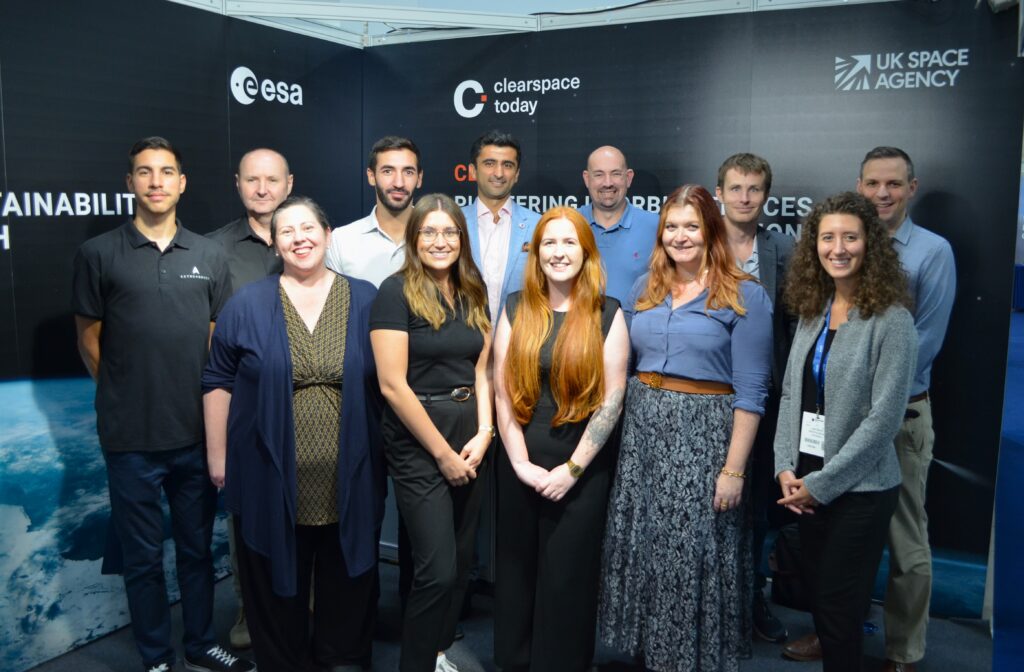Disused satellites will be removed from orbit in milestone moment for sector
A UK-based consortium has been awarded £2.2 million funding to prepare a space debris mission in Low Earth Orbit (LEO).
The UK Space Agency has provided the multi-million pound backing to a mission led by innovative start-up, ClearSpace, to retrieve two derelict satellites at an altitude of 700km.
Known as Clearing the LEO Environment with Active Removal (CLEAR), the mission will be a crucial landmark in positioning the UK as an emerging world leader in space sustainability.
The consortium also includes the backing of strategic space communications specialists, AstroAgency, to provide messaging and awareness-raising for the flagship mission for the UK’s burgeoning space sector as the project enters the next phase in technical adequacy

The Edinburgh-headquartered firm has worked with over forty global space clients to date, including some of the biggest names in commercial space and a host of government agencies, with the CLEAR mission the latest in a list of sustainability focused initiatives for space.
Earlier this month, the firm unveiled the world’s first Sustainable Space Roadmap, commissioned by Scottish Enterprise, setting out work packages for space stakeholders across industry and academia to collaborate around, with a common aim of developing a more environmentally conscious space sector both on the ground and
in orbit.
Rory Holmes, ClearSpace UK Managing Director said: “Space is getting more and more congested with defunct satellites, rocket bodies and other fragments – we have to act now to ensure this precious environment remains usable for future generations.
“With the UK Space Agency’s leadership, the UK is now at the forefront of developing the missions and technologies needed to address the challenge of space debris. We are excited to start working with Astroagency to raise awareness of the issue of space debris and to highlight the world-leading activities that are being performed in the UK to address it.”
The two disused UK-owned satellites that will be removed from orbit, inactive for more than a decade, have the potential to remain in the most congested part of space – low Earth orbit – for up to 100 years before atmospheric drag would eventually cause the objects to naturally re-enter the atmosphere and burn up. The danger is that with thousands of satellites to be launched and astronauts inside the International Space Station, leaving old satellites and broken fragments of debris orbiting the planet could have disastrous consequences due to the potential for a collision.
The CLEAR mission aims to provide a crucial step towards protecting the space-based infrastructure such as transport, financial, weather and climate change monitoring systems from rogue debris in one of the most sought-after regions of the Earth’s orbit due to its ideal proximity to our planet.
The UK Space Agency commissioned a study by the ClearSpace-led consortium last October into how a retrieval mission could be carried out, evaluating a number of scenarios and identifying the requirements and resources needed to achieve success.
The preliminary phase was completed in March 2022, and the newly awarded funding will power a detailed design phase which is expected to be completed by the end of 2023.
Dr Paul Bate, Chief Executive of the UK Space Agency, said: “As our reliance on space technologies increases rapidly and the UK becomes a global hub of satellite design, manufacturing and launch, we are committed to leading efforts to make space more sustainable. With 1,700 satellites launched last year alone, the need to safeguard the space environment for the benefit of everyone on Earth has never been more pressing.
“By catalysing investment, backing innovative new technologies and supporting a national mission to remove space debris, we can keep space open for future generations and protect the important satellite services that modern life depends on.”
Daniel Smith, Founder of AstroAgency, said: “As a UK headquartered company with a passion and track record for promoting the importance of a more environmentally conscious approach to commercial space activity, we couldn’t be more proud to be part of the CLEAR mission consortium.
“Like so many of our public and private sector clients, AstroAgency is committed to a more sustainable space sector both on Earth and in orbit, and CLEAR’s contribution to clearing space debris and safeguarding operational satellites – that provide so many services we use every day often without realising it – is a vital step towards this goal.”
The CLEAR mission will act as a cornerstone for UK companies aspiring to be at the forefront of the emerging in-orbit services market which is forecasted to reach $14.3 billion in cumulative revenue by 2031.
It comes after the UK announced last month its Plan for Space Sustainability to mark out the UK as a front-runner in the emerging sector. The projects will directly support the creation of 20 new jobs, with further opportunities to increase growth in the wider UK space sector, which already supports 47,000 jobs and generates an income of £16.5 billion each year.
AstroAgency provides space sector organisations and those considering entering the lucrative and fast-growing commercial space market with a unique combination of strategic marketing support, business development, brand building techniques, media coverage, detailed technical knowledge and all-important sector intelligence.
The firm’s impressive client list includes the likes of the UK Space Agency, Australian Government, Scottish Government and local council authorities in Ayrshire, Cornwall, Caithness, Norfolk and Suffolk, along with a growing number of private space companies across the globe working in satellite manufacture, launch and Earth observation data analysis.
The company is comprised of international space specialists who work across the space value chain from satellite manufacture and launch to downstream data analysis. Its international team are all remote based and boast a presence in Edinburgh, London, Cardiff, Milan, Amsterdam and Toulouse.
For more information on AstroAgency, please visit https://astroagency.co.uk/
